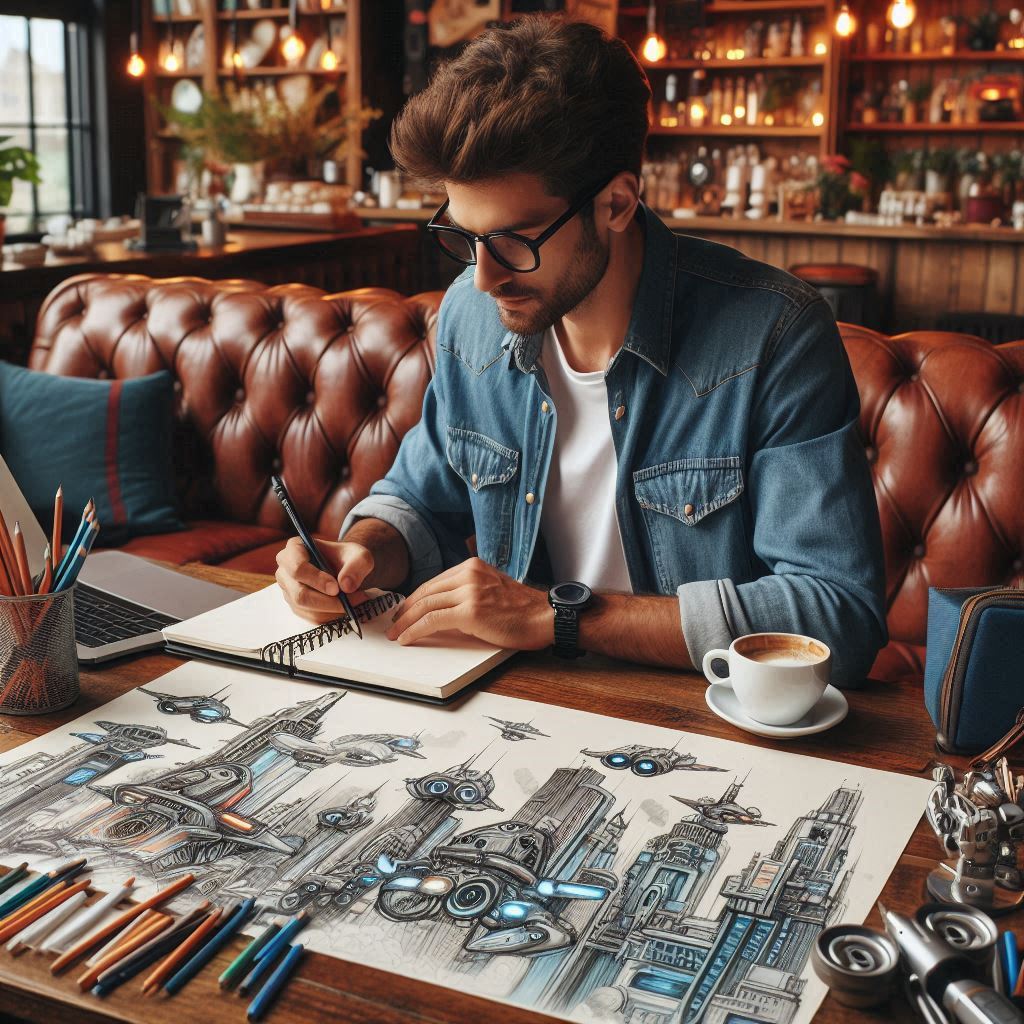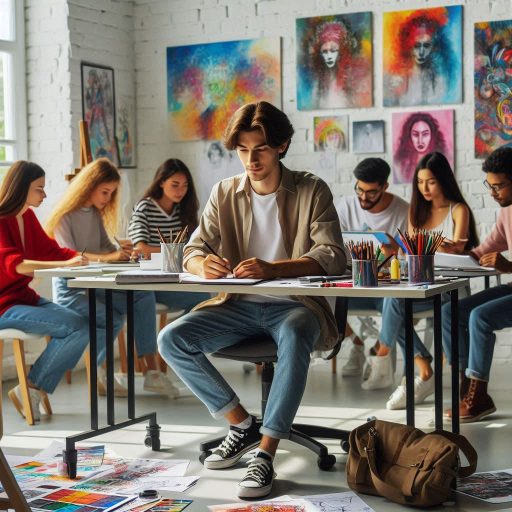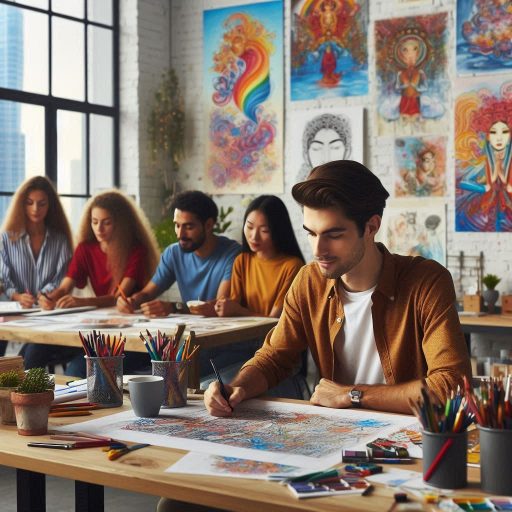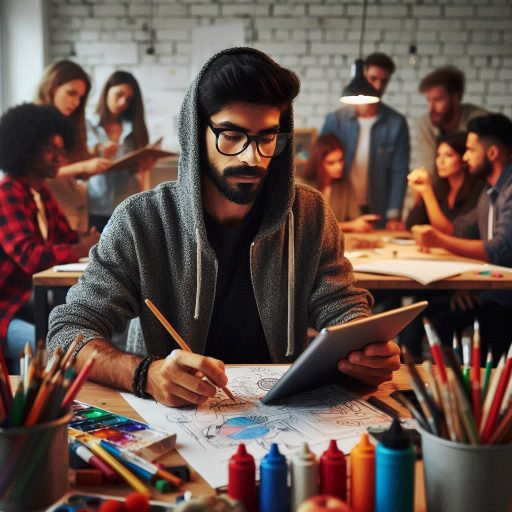Introduction
Art and design conferences play a crucial role for concept artists.
These events provide invaluable opportunities for learning and networking.
Attending conferences helps artists stay updated on industry trends and innovations.
They also offer platforms for sharing ideas and experiences with peers.
Networking with fellow artists and industry professionals can lead to new collaborations and job opportunities.
Concept artists can gain insights from experienced speakers and mentors, enhancing their skills and knowledge.
In this blog post, we will explore the top art and design conferences specifically geared toward concept artists.
We will cover various events that focus on skill-building workshops, industry trends, and exposure to new tools.
Each conference offers unique experiences that can significantly benefit your artistic journey.
Whether you are an emerging artist or an established professional, these conferences can enhance your career.
Join us as we delve into these exciting events and discover how they can elevate your concept art practice.
Your journey towards improvement and inspiration starts with the right conference!
The Importance of Networking
Significance of networking with fellow artists, industry professionals, and potential clients at art conferences
Networking plays a crucial role in the success of concept artists.
Attending art and design conferences allows artists to connect with fellow creatives and industry professionals.
These events serve as a hub for like-minded individuals who share similar passions and goals.
Meeting new people can expand your artistic horizons and introduce you to diverse perspectives.
By networking, concept artists can learn from established professionals in the field.
Conversations with experienced artists can provide valuable insights into the industry.
You can gain tips on improving your skills or navigating career challenges.
Such connections can become a source of inspiration and guidance throughout your career.
Networking at conferences can lead to new opportunities for collaboration.
Engaging with other artists may spark ideas for joint projects.
Collaboration can enhance your portfolio and introduce you to different styles and techniques.
These experiences help you grow as an artist while building a diverse network.
Furthermore, networking enables concept artists to showcase their work to potential clients.
Presenting your portfolio at conferences can capture the attention of industry leaders.
These connections can lead to job offers or freelance projects.
Building relationships with clients is essential for establishing a steady flow of work.
How networking can lead to new opportunities, collaborations, and mentorship for concept artists
Mentorship is another significant benefit of networking.
Connecting with seasoned professionals can lead to mentorship opportunities.
A mentor can provide invaluable guidance as you navigate your career.
They can offer feedback on your work and help you set achievable goals.
Mentorship can also open doors to new opportunities that may not be available otherwise.
Networking encourages you to step out of your comfort zone.
Engaging in conversations with strangers can feel daunting.
However, each interaction builds confidence and improves your communication skills.
This practice will serve you well in your career, as effective communication is vital in the art industry.
Additionally, attending conferences allows you to stay updated on industry trends.
Engaging in discussions with fellow artists and professionals keeps you informed.
Knowledge of emerging trends can enhance your work and make you more marketable.
Staying ahead of the curve can give you a competitive advantage.
Social media also plays a role in networking, especially during conferences.
Many events promote their hashtag on social platforms.
Engaging with attendees online expands your reach and allows you to connect with people before and after the conference.
Following up with new contacts is essential to maintaining these connections.
Networking at art and design conferences is vital for concept artists.
Connecting with fellow artists, industry professionals, and potential clients leads to valuable opportunities.
Networking fosters collaboration and mentorship, which can greatly impact your career.
Embrace every opportunity to network at conferences and watch your artistic journey flourish.
Building a strong network will enrich your career, inspire you, and open doors to countless possibilities.
Attend these conferences with an open mind and a willingness to connect, and you will reap the benefits in your artistic endeavors.
Read: Networking Events for Costume Designers
Skill Building Workshops and Panels
The workshops, panels, and masterclasses offered at art conferences for concept artists
Art conferences offer a wealth of workshops, panels, and masterclasses designed specifically for concept artists.
These sessions cater to various skill levels, from beginners to seasoned professionals.
Participants can learn directly from industry leaders and renowned artists, gaining valuable insights and knowledge.
Each conference typically features a diverse range of topics, covering everything from traditional drawing techniques to digital art methods.
Workshops often include hands-on experiences, allowing artists to practice new skills in real-time.
Participants can create concept art pieces while receiving direct feedback from instructors.
This interactive format enhances learning and helps artists grasp complex techniques more effectively.
Many conferences also offer specialized panels, where artists discuss their experiences and share industry secrets.
These discussions provide attendees with a deeper understanding of the challenges and rewards of working in the field.
How these sessions can help artists enhance their skills, learn new techniques, and stay updated on industry trends
Attending these workshops and panels helps artists refine their existing skills while learning new ones.
The emphasis on practical application ensures that participants can immediately implement what they learn.
For instance, a workshop on character design may teach artists how to develop compelling backstories alongside visual concepts.
This holistic approach to art-making fosters well-rounded artists who can tackle various projects with confidence.
Moreover, these sessions often cover the latest tools and software used in the industry.
Many workshops focus on digital art programs like Photoshop, Procreate, and others.
Artists gain hands-on experience with these tools, enabling them to improve their efficiency and creativity.
Understanding new technologies is crucial for staying competitive in the rapidly evolving art landscape.
In addition to technical skills, workshops and panels provide insights into industry trends.
Knowledge of current trends informs an artist’s work, ensuring it resonates with clients and audiences.
Many panels feature discussions on emerging themes and styles, allowing artists to adapt their work accordingly.
This awareness can lead to innovative approaches and unique artistic expressions.
Read: Freelance vs. In-House Costume Design Jobs
Exposure to Industry Trends and Innovations
How attending art conferences can expose concept artists to the latest trends and innovations in the industry
Attending art conferences offers concept artists valuable exposure to the latest industry trends and innovations.
Conferences often feature keynotes from industry leaders who discuss their insights on emerging trends.
Artists can learn about popular styles, techniques, and themes currently shaping the art world.
This exposure allows artists to adapt their work and remain relevant in a competitive field.
Conferences also showcase the latest innovations in tools and software used for concept art.
Many leading companies present their newest products and features during these events.
Artists can attend live demonstrations that highlight the capabilities of the latest software.
This firsthand experience helps artists decide which tools best suit their creative needs.
Networking opportunities at conferences enhance exposure to industry innovations.
Engaging with peers and professionals opens discussions about new techniques and tools.
Artists can exchange tips and recommendations, expanding their knowledge base.
Learning from others‘ experiences can inspire artists to experiment with innovative approaches in their work.
Benefits of staying informed about new tools, software, and technologies for concept art
Staying informed about new tools and technologies significantly benefits concept artists.
New software often introduces features that enhance workflow and creativity.
Understanding these tools allows artists to work more efficiently and produce high-quality work.
For example, innovative 3D modeling software can save time while improving the visual impact of designs.
Awareness of industry trends helps artists understand client expectations.
Clients often seek artists who can deliver contemporary styles and concepts.
By staying updated, artists can align their portfolios with current market demands.
This adaptability can lead to more job opportunities and increased commissions.
Additionally, new technologies can open doors to various creative possibilities.
For instance, advancements in virtual reality (VR) and augmented reality (AR) are transforming how concept art is presented.
Artists can create immersive experiences that captivate audiences and clients alike.
Embracing these technologies can set artists apart from their competition.
Attending conferences also fosters a culture of continuous learning.
Artists can participate in workshops and sessions focused on new tools and techniques.
This environment encourages artists to explore innovative methods and expand their skill sets.
By continuously evolving, artists enhance their overall proficiency and versatility.
Incorporating new trends and tools into their work can lead to exciting projects.
Artists who embrace innovation can push boundaries and explore uncharted territories.
This mindset promotes artistic growth and can lead to unique creative expressions.
Moreover, being part of the conversation around industry innovations positions artists as thought leaders.
Engaging in discussions about emerging trends can enhance credibility and visibility.
Artists who share their insights and experiences can build a strong professional reputation.
Art conferences play a vital role in exposing concept artists to industry trends and innovations.
These events provide essential insights into new tools, software, and technologies.
Read: Collaborating with Other Creative Roles
Portfolio Reviews and Feedback
Importance of receiving feedback on your portfolio from industry professionals at art conferences
Receiving feedback on your portfolio is crucial for growth as a concept artist.
Art conferences provide unique opportunities for artists to connect with industry professionals.
Engaging in portfolio reviews allows artists to gain valuable insights into their work.
These reviews help artists identify strengths and weaknesses in their portfolios.
Industry professionals can provide objective opinions that you may overlook.
They bring experience and knowledge of current trends in the industry.
This feedback helps you understand how your work resonates with others.
It also clarifies whether you meet industry standards and expectations.
Such insights can enhance your artistic direction and inspire your future projects.
Portfolio reviews encourage you to articulate your artistic choices.
Explaining your work to professionals sharpens your communication skills.
It teaches you how to present your ideas clearly and confidently.
This skill is vital for any concept artist aiming to collaborate on projects.
Strong communication fosters effective teamwork and collaboration in the creative industry.
Moreover, feedback from industry experts can lead to deeper conversations about your work.
These discussions can uncover innovative ideas and fresh perspectives.
You may learn about new techniques or trends that can elevate your art.
Such exchanges can broaden your understanding of the art community and its dynamics.
How portfolio reviews can help concept artists identify areas for improvement and showcase their work to potential clients
In addition to providing insights, portfolio reviews showcase your work to potential clients.
Professionals in the industry often seek new talent at conferences.
A strong portfolio can capture their attention and lead to future opportunities.
This exposure is essential for concept artists looking to establish their careers.
Participating in these reviews allows you to network and build relationships.
Strong connections can lead to collaborations and job offers.
Industry professionals frequently scout for new talent during conferences, making it an opportune time to shine.
The feedback you receive can enhance your portfolio’s overall quality.
Incorporating constructive criticism into your work can make a significant difference.
To maximize the benefits of portfolio reviews, come prepared.
Select your best pieces that demonstrate your skills and creativity.
Include a variety of styles and subjects to show your versatility.
Prepare to discuss your artistic process and the decisions behind each piece.
This preparation shows that you are serious about your art and career.
Stay open to feedback, even if it’s challenging to hear.
Use the input to refine your portfolio and improve your craft.
Embrace suggestions and consider how they align with your artistic vision.
This process of reflection and adjustment is key to growth as an artist.
Additionally, follow up with the professionals after the review.
Thank them for their time and insights, and express your interest in their work.
Maintaining these connections can lead to further opportunities and collaborations.
Portfolio reviews at art conferences are invaluable for concept artists.
They provide opportunities for feedback, networking, and growth.
Engaging with industry professionals helps you identify areas for improvement.
By showcasing your work, you open doors to potential clients and collaborations.
Embrace these opportunities to enhance your skills and advance your career in concept art.
Read: Top Skills Needed for Art Educators and Instructors

Discover More: How to Get Clients as a Freelance Advertising Designer
Career Development Opportunities
Career development opportunities available to concept artists at art conferences
Art conferences offer numerous career development opportunities for concept artists.
Job fairs and recruitment events are two primary avenues where artists can connect with potential employers.
These events allow artists to meet hiring managers and showcase their portfolios directly.
Engaging in these settings enables you to make a lasting impression.
It also provides a platform to discuss your skills and experiences in detail.
Attending portfolio reviews at these conferences further enhances your career prospects.
Here, industry professionals provide valuable feedback on your work.
Their insights can help you refine your portfolio to meet industry standards.
This constructive criticism can be crucial in helping you identify areas for improvement.
It ultimately prepares you for future job applications and interviews.
Networking plays a significant role in career advancement.
Conferences provide a unique environment to build connections with industry leaders and fellow artists.
These relationships can lead to collaborations and job offers that may not be advertised publicly.
Engaging in conversations with professionals can open doors to mentorship opportunities.
These mentors can guide you through your career journey, providing advice and support.
How attending these conferences can help artists advance their careers and find new opportunities in the industry
Attending art conferences is a proactive way to advance your career.
By participating in various events, you immerse yourself in the industry.
You gain firsthand knowledge of trends, innovations, and potential job openings.
This exposure equips you with the information necessary to make informed career decisions.
Many conferences feature workshops and panels led by industry experts.
These sessions focus on skill development and the latest technologies in concept art.
Attending these workshops helps you stay competitive and relevant in the field.
You can learn new techniques and best practices that enhance your artistic capabilities.
Additionally, some conferences include keynote speeches from renowned artists and industry leaders.
These sessions inspire and motivate artists by sharing success stories and career paths.
Hearing about others‘ journeys can provide valuable insights and spark new ideas for your own career.
Moreover, networking at conferences can lead to unexpected opportunities.
Conversations with fellow artists might result in collaborations on projects.
These partnerships can enrich your experience and help you grow as an artist.
You may also learn about job openings that are not publicly advertised.
This inside knowledge can give you an edge in your job search.
Art conferences provide numerous career development opportunities for concept artists.
Job fairs, recruitment events, and portfolio reviews are essential for building connections and advancing your career.
Engaging with industry professionals and peers fosters collaboration and opens doors to new opportunities.
By participating in these events, you equip yourself with the tools necessary to succeed in the competitive field of concept art.
Make the most of these opportunities to enhance your skills and propel your career forward.
Diversity and Inclusion in the Art Community
Importance of promoting diversity and inclusion in the art community at conferences
Promoting diversity and inclusion in the art community is essential for fostering creativity and innovation.
Art reflects the society in which it exists.
A diverse community brings various perspectives, ideas, and cultural backgrounds.
This richness enhances artistic expression and expands the scope of creativity.
Conferences play a vital role in advocating for diversity by providing an inclusive environment.
By prioritizing diversity and inclusion, conferences can break down barriers that often limit participation.
They can create a welcoming space for artists from various backgrounds to share their work.
This inclusivity encourages more voices to be heard and celebrated within the industry.
Addressing underrepresentation enriches the artistic landscape and promotes understanding among different communities.
How art conferences can provide a platform for underrepresented artists
Art conferences serve as a platform for underrepresented artists to showcase their talents.
These events provide opportunities for emerging artists to display their work to a broader audience.
By featuring diverse artists, conferences can highlight their unique stories and perspectives.
This representation can lead to greater visibility and recognition in the art world.
Additionally, conferences create networking opportunities for underrepresented artists.
They can connect with industry professionals who can help them advance their careers.
Building relationships with established artists and industry leaders is crucial for emerging talents.
These connections can lead to collaborations, mentorships, and job opportunities.
Many conferences actively curate panels and discussions focused on diversity in the arts.
These sessions encourage dialogue around challenges faced by underrepresented artists.
Engaging in these conversations fosters understanding and promotes a culture of inclusivity.
It also inspires industry professionals to reflect on their practices and consider ways to support diverse talent.
Furthermore, some conferences offer scholarships and grants specifically for underrepresented artists.
These initiatives help remove financial barriers that may prevent participation.
By investing in diverse talent, the art community can cultivate a more vibrant and dynamic ecosystem.
Supporting these artists ensures that their voices and visions are part of the broader artistic narrative.
Diversity and inclusion are vital for the growth and richness of the art community.
Conferences play a significant role in promoting these values by providing platforms for underrepresented artists.
Through showcasing diverse talents, fostering connections, and encouraging meaningful dialogue, art conferences contribute to a more inclusive industry.
By embracing diversity, the art community can inspire creativity and innovation while reflecting the richness of human experience.
It is essential for all artists, industry professionals, and conference organizers to prioritize these efforts.
Conclusion
Attending art and design conferences offers immense benefits for concept artists.
These events provide invaluable networking opportunities with fellow artists and industry professionals.
Connecting with others can lead to collaborations and mentorship that enhance careers.
Conferences also host skill-building workshops and panels.
These sessions help artists learn new techniques and stay updated on industry trends.
Participating in hands-on workshops fosters skill development and innovation.
Additionally, attending these conferences exposes artists to the latest trends and technologies.
Understanding new tools and software keeps artists relevant in the rapidly changing landscape.
Staying informed about innovations can lead to exciting projects and career advancements.
Art and design conferences serve as vital platforms for growth.
They offer opportunities for networking, skill enhancement, and exposure to industry innovations.
Concept artists should prioritize attending these events to build connections and gain insights.
By investing time in these conferences, artists can take significant steps in advancing their careers.
So, mark your calendars and explore upcoming conferences in your area.
Embrace the chance to learn, network, and elevate your concept art practice.




